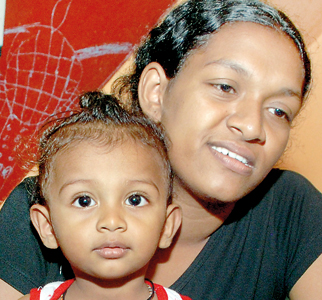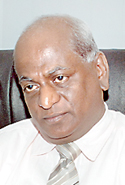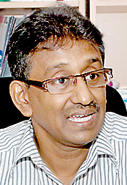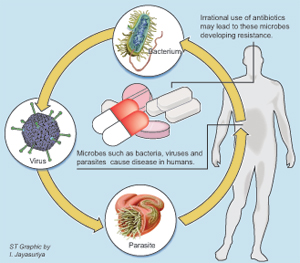News
Seven young men wanting a kick out of life go to early grave
Did a deadly cocktail of medicine and other substances send seven young men to an early grave, is the concern of health authorities, in the wake of which the sale of an often-prescribed cough syrup has been banned temporarily.
With information indicating that several of the dead men, mainly between 20 and 30 years old, had ingested the cough syrup Corex or Corex-D, the Cosmetics, Devices and Drugs Regulatory Authority (CDDRA) Director Dr. Hemantha Beneragma ordered on Tuesday (October 9) that the sale of these medications be withheld “as a precautionary measure”.
“We are awaiting more information and we understand that blood and urine samples of the victims have been sent to the Government Analyst for checking,” Dr. Beneragama said.

Thushari and baby, victim Madushanka’s wife. Pix by M.D. Nissanka and M.A. Pushpa Kumara
The seventh person died on Thursday after about 11 days at the National Hospital in Colombo. The men were from Mattakuliya, Dematagoda, Wellampitiya, Kolonnawa and Talawathugoda, with Thotalanga allegedly being a hub for the distribution of this syrup known in common parlance as “pani”.
When the Sunday Times visited Thotalanga, many people mentioned two or three places which were known for selling the “pani”. One was a “clinic” run by a so-called doctor. Neighbours said the clinic attracted a large number of young men, about 30-40 daily, after about 5 p.m.
Even as three-wheeler drivers and passers-by explained the alleged activity taking place including the sale of Corex and tampa (called “nilla soya”), the time being about 5.30 p.m. on Thursday, a youth walked halfway up the stairs to the closed “clinic” and on seeing the knot of people, rushed away, while another youth carrying a helmet did the same.
In a desolate home in congested Samithpura, Mattakuliya, 19-year-old Thushari and her one-plus baby boy, Himal, have just returned from the kanatte (cemetery).
“We lit some candles for Ishara Madushanka,” says Thushari, hugging the baby. Having eloped with Ishara a couple of years ago, they had married and had the little one. It was only two weeks ago that they moved to a new place, to be alone as a family.
Conceding that her husband “eka, eka deval pavichchi kara”, she says that he “used” not only “pani” but also ganja, beer and cigarettes. Ishara who was working for a beverage company as a delivery man, had come back on the evening of October 2, but left soon after saying that he had to collect his wages. It was about 1 a.m. the next day that he returned, very drunk, with two others and two bottles of beer.
When they wanted to drink at home, Thushari chased away the other two and made Ishara eat a little rice, dhal and soya that she had cooked. After his meal, instead of water, he drank the bottle of beer in one go, she says, adding that in their short time together he sometimes assaulted her after taking these substances.
“When I tried to wake him at 7 a.m. to go to work, he said he was very tired, refused his tea and went back to sleep, asking that the baby should not disturb him. The baby normally crawls over him in the morning, wanting to play,” Thushari sighed.
By 2 p.m., Ishara’s hands and feet were cold and Thushari, called her brother in a panic. When they took him to hospital he was dead, she says, adding “api thaniwuna”. (We are alone now).
The Thotalanga “clinic”, meanwhile, had been raided by police and CDDRA’s Food and Drugs Inspectors and 15 young men taken into custody of whom 14 have been remanded. Colombo Crimes Division Assistant Superintendent of Police (ASP) Nuwan Wedasinghe said. These 14 were confirmed by the Judicial Medical Officer (JMO) as being drug addicts and are to be rehabilitated.The raid followed requests by the Coroners and JMOs who conducted the inquests and the post-mortems which had found that the dead men had ingested the cough syrup, the ASP said.
While stressing that there has been “no quality failure” with regard to Corex or Corex-D, CDDRA Director Dr. Beneragama said the deaths had most probably resulted from the over-use of this syrup, bought illegally or issued illegally to “make a quick buck”.
Both Corexes are Schedule II B medications, he pointed out, explaining that it means that they are prescription-only medications and no one can buy them over the counter.
They can also be sold only at pharmacies registered with the CDDRA, prescribed only by a qualified medical doctor registered by the Sri Lanka Medical Council (SLMC) and dispensed by a registered pharmacist. The company can only sell the product to registered wholesale distributors and in turn to registered retail pharmacies.
There seems to be an organized attempt by unscrupulous elements to get people addicted to Corex, Dr. Beneragama said, adding that the saga of not only the misuse and abuse of Corex but also other medications such as Tramadol began a few years ago. Then the CDDRA instructed Astron Limited, the company manufacturing Corex and Corex-D, to ensure post-marketing surveillance to prevent the abuse of the medication while introducing registers at pharmacies to record the sales.
“There is nothing wrong with these medications,” the CDDRA Chief pointed out, reiterating that medications are chemicals and as such should be used according to the information and instructions issued with them.
 CDDRA Director Dr. Hemantha Beneragama |
 CDDRA Food and Drugs Inspector Amith Perera |
Referring to the Thotalanga “clinic”, Dr. Beneragama said that the “doctor” running it had been summoned to the CDDRA and whether he is a doctor is being verified from the SLMC.
All the medications in the “clinic” including the Corex have been taken into CDDRA custody and investigations are underway, said Food and Drugs Inspector Amith Perera, pointing out that Corex and Corex-D have been withheld from sale to stop the circulation of this medication among the people and thereby its abuse. Pharmacies can keep the stocks they already have but cannot sell them until the ban on its sale has been lifted.
Astron’s Marketing Director Sirimal Fernando told the Sunday Times that the company has been manufacturing Corex in Sri Lanka for 44 years and Corex-D for 34 years. These medications have been prescribed by doctors and sold through pharmacies all this while and there has been no product-recall as there has been no quality failure or changes in the formulation.
“Corex and Corex-D are safe and have efficacy.
Not only is the dosage clearly marked on the bottle label and cartoon, a measuring spoon is also provided. The maximum dosage and the number of times it should be taken daily are also stated. Pharmacies are issued fresh stocks of these medications only when their stocks are sold.”
As the authorities await the final findings on the deaths of the seven young men, CDDRA Director Dr. Beneragama sends out an appeal to parents to be vigilant about the activities of their children at school, at tuition classes and also among their peers.
Corex under microscope
A bottle of Corex obtained from the Thotalanga communication centre has been handed over to Prof. Ravindra Fernando, Professor of Forensic Medicine and Toxicology of the Colombo Medical Faculty, for analysis.
A certain substance in this medication and several other medications, if abused, causes euphoria, central nervous system stimulation and visual and/or auditory hallucinations, Prof. Fernando said. The Sunday Times withholds the name of this substance in the public interest.
Effects of this substance on the central nervous system include imbalance in walking, drowsiness and rarely coma, said this expert.

The “clinic” that was raided by the CDDRA
“Stimulation of the central nervous system may be observed with restlessness and increased muscle tone with body rigidity. With extremely large ingestions, respiratory depression can occur which can be fatal,” he said.
Pointing out that these toxic effects of this substance were discussed at an ‘International Programme on Chemical Safety’ held in Cardiff, Wales, way back in 1996, Prof. Fernando reiterated that an active Poison Information Centre has a fundamental role to play in toxico-vigilance and prevention.
Monitoring the toxicity of pharmaceuticals for acute, medium-term and chronic effects is the duty of the Poison Information Centre, he added.
Post-mortems showed history of regular use
The alarm about the misuse of Corex and Corex-D was sounded after the post-mortems and inquests into the deaths of these young men, which had indicated a history of ingestion of this medication.
Colombo City Coroner Edward Ahangama held the inquests on two deaths – a cricketer (name withheld), 29, from Kaduwela who succumbed on September 30 and Ruwan Rajapaksa, 22, from Mattakkuliya on October 11.
Colombo’s Additional Coroner Ashroff Rumi held the inquests on three others – Sathuranga Pushpakumara, 26, from Dematagoda who succumbed on September 27; Lakshan Muthumala, 17, from Wellampitiya on October 1; and Ishara Madushanka, 21, from Mattakkuliya on October 4.
The evidence led at all the inquests seems chillingly similar.Quoting the statement made by a friend, Mr. Ahangama said the cricketer had gone to the friend’s place on September 29 to watch the cricket match on television. There were a group of six at his home that night and they smoked five cannabis (ganja) cigarettes among them. When the cricketer said he was sleepy, he allowed him to sleep at his home.
At about 3.30 a.m., the next day, as the cricketer looked pale and his body had grown cold, the friend took him to the National Hospital where doctors pronounced him dead, the friend had said.
The cricketer’s mother, a marketing manager in a private hospital, had said that he was her only son. He had passed his Ordinary Level exam from a good school in Colombo and was very keen to play cricket. He had held several jobs thereafter and was due to be part of a cricket team that was going abroad soon. He was also due to marry on December 28. He used cannabis after playing cricket but not regularly. She had warned him not to take cannabis, she said.
As the mother had said she suspects foul play, the Coroner had postponed the inquiry to December 22, while National Hospital JMO Dr. Raveendra Samaranayake who performed the post-mortem said that it would take about three months to release the report.
In the other death inquired into by Mr. Ahangama, witnesses had indicated that the victim had consumed Corex-D regularly, with one buying the syrup from a communication centre at Thotalanga.
Meanwhile, Mr. Rumi told the Sunday Times that the men seemed to have used drugs as well as Corex. A friend of Ishara Madushanka had given a statement that the victim had bought the red liquid from a Thotalanga “pharmacy” where anyone could get it.
The contents had to be drunk immediately and the bottle returned to the “pharmacy”. It appeared as if a “doctor” at Thotalanga was distributing Corex to drug addicts as well as non-drug addicts to get them addicted as well, Mr. Rumi added. Ishara’s post-mortem was performed by National Hospital JMO Dr. Roohul Haq.
Follow @timesonlinelk
comments powered by Disqus





















